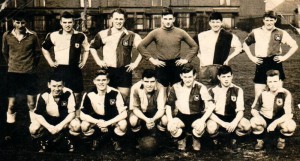
April 28, 2014, by Editor
The road to Nottingham Pier

The all-conquering Bolton School 1st football team -this was taken in March 1957, the year I went up to Nottingham University.
Stevens is the nice-looking lad 3rd from the right at the back (in the goalkeepers jersey).
I am very pleased to announce that we have a new blogger in town! This eminent person is our very own Emeritus Professor, Malcolm Stevens. He has agreed to share with us ‘His Story’ and the first instalment can be seen below!
The 1950’s was not the ideal decade to be in one’s teenage prime. For the ‘Mario Lanza generation’ the 50’s was a period of post-war austerity and marked the loss of the nation’s ‘world power’ status. Still, one was spared the prospects of having to go to a serious war which boys born a decade earlier than me faced. Moreover, because of a dubious academic prowess which enabled one to escape military conscription to go to university in 1957, it was possible to avoid having to fight in any of the many futile, and ultimately losing, wars to preserve the tattered remnants of Empire. But, most perversely, for spotty teenage lads entering university then awash with high blood titres of androgenic steroids – and fresher girls dangerously primed with oestrogens – sex was still subject to post-war rationing. It wasn’t until the early 60s, following the inspired work of Carl Djerassi at Syntex, that oral contraceptives became widely available and more libidinous times beckoned. It was over 50 years later, in 2009, that Djerassi and I met at the Royal Society in London, when we were both inductedas Fellows of the Society.Whatever took the Royal so long?
I can recall some of the signal events which led me into pharmacy. In 1947, aged nine, I contracted a Streptococcal infection of the mastoid bone in the ear. Maybe this was due to the deficiencies of a war-time diet on my developing immune system, which any amount of cod liver oil, powdered egg and potato, concentrated orange juice, or mashed swedes couldn’t supplement. (And yes I had no bananas either.) Mastoiditis was potentially a life-threatening condition and I was treated with M&B 693 (sulfadiazine) and the crude penicillin G (benzylpenicillin) then just being made available for civilian use. I am reminded of the beery, poppy broth which was infused into me every time I have a glass of lager seven decades later. Sadly, these prototypic chemotherapies failed to reach their target sites and, after suffering many months of sullen and mounting ear ache, relieved only partially by wearing a hot tea cosy over my head, I had to be operated on to drain the infected canals.
In my early teens at Bolton School, because of the lengthy time off for illness, I lurked, unnoticed academically, in the lowest class streams. Also scholarly work suffered because of serious competing interests – in music, chess, scouting, natural history, and athletics; later I also became one of the School’s best rock-n-rollers. In the 1950s sporting talent, including the now robust Stevens, was channelled into the School’s all-conquering football teams; small and wiry lads who couldn’t cope with the glutinously muddy playing fields, were forced to do cross-country running; and anyone who was useless played hockey, except when their mothers wrote them excuse notes if it rained, which was often. After games, whereas the muddied footballers made do with their blocks of carbolic soap, which contained several percent phenol and made your eyes sting, the hockey players rarely got their knees dirty and were the first to adopt those new scented soaps with which to wash themselves, each other, and their hair. (Now what wholesome lad in the 50s washed their hair I ask? Tony Curtis, the legendary Hollywood heartthrob of the time, who gave his name to the eponymous hair style, owed his sexual conquests of the silver-screen starlets partly to his swept back and oiled locks. Similarly, an ability to arouse interest in Bolton girls was directly proportional to the amount of greasy Brylcreem on ones hair.) One scurrilous rumour had it that it was the hockey players who spread the skin disease impetigo throughout the School by sharing their soap. I remember painting myself with a solution of crystal violet to treat this rampant plague caused by the micro-organism Staphylococcus aureus. It was some years later that I synthesised a sample of the drug in a pharmacy practical class. What a glorious molecule it is.
In science lessons at Bolton School in the 50’s I avidly imbibed information on new scientific and medical breakthroughs, especially the discovery of the structure of DNA, and wanted to be part of the excitement of invention. I still am, actually. I just lurved chemistry practical classes and, conspiratorially, experimented with class mates to make various explosive mixtures – based on aluminium powder and sulphur with a secret strong oxidizing agent, I recall – which were used to make home-made fireworks and propellants to launch bicycle pump tubes into low earth orbit. We even developed a slow-burn mixture which would give a controlled launch of a primitive rocket plane which was test fired on the School playing fields one lunchtime. Sadly we were never going to be rivals to Werner von Braun. Quite how we managed to avoid personal injury and expulsion from School I’ll never know; I get hot flushes at the very thought now. It was twenty years later that I was involved in a laboratory accident when researching an unstable compound.
My upbringing in sooty Lancashire also infected me with those solid northern virtues – contempt for the Church of England and abhorrence of the Tory Party and its works. In addition, years of supporting my beloved Bolton Wanderers from the terraces at Burnden Park fostered a visceral and healthy loathing of Arsenal, Chelsea, Tottenham Hotspur, Fulham, Queen’s Park Rangers etc, etc. Get the picture? Stevens watchers – there are a few, apparently – have noted that I have lugged this baggage through into my eight decade. My headmaster, the formidable FR Poskitt, persuaded me to apply to his own college, Downing College, Cambridge, to study natural sciences on the grounds that he knew I was a decent goalkeeper and “Downing’s footballing stock was low at the time.” (Note: nothing about their scientific prowess!) At interview I fell foul of an objectionable don who mocked my northern roots and Lancashire accent. I just can’t stand prejudice. This rejection still rankles with me today but, perversely, not going to Cambridge was the making of my career, as I am keen to point out to Oxbridge types whenever I meet them. In the event my two choices for university narrowed down to Chemistry at Hull or Pharmacy at Leeds. Agreed, not very imaginative choices, but consistent with my long love affair with the drizzly cities of the North of England. Living close to a pharmacy in Bolton I was allowed to go into the dispensary where I was assailed by wondrous smells and hues and impressed by the pharmacist’s skills in dispensing his potions and wisdom to gullible patients. That settled it: it was Leeds – but then it wasn’t.
One week before the start of term I was informed by Leeds that, because of insufficient numbers of qualified applicants, they would not be offering the course that year. Panic stations! Poskitt turned up trumps this time: “Nottingham is the place for pharmacy,” he boomed, “They have all that Boots money spent on them so they must be good.” It never was true and it is amazing that this misperception still operates to the Pharmacy Department’s advantage over half a century later. After a brief ‘phone call, a friendly interview with Drs Cooper and Turner, and I was in with a day to spare before the start of term. What a shrewd move eh?
I turned up at campus with my worldly goods in a large suitcase but had no accommodation arranged because of my late acceptance. Hugh Stewart and Wortley Halls, the only male residences at that time, said “Sorry, no room at the inn.” I was prepared to bunk down in a hidden recess I had discovered in the Portland Building, which had just been opened or, if ejected, on a bench in Highfields Park, when I happened to meet a fellow Boltonian who took me back to his Lenton lodgings off Willougby St at the back of the Savoy cinema on Derby Rd. There I was welcomed in by his landlady, the truly wonderful Ada Gillott, and I was to lodge there in her freezing attic room for a further five years. It was a mean house where the loo was a hole in the ground in a shed at the bottom of the garden and the only washing facilities were provided by a gas Ascot heater in a kitchen measuring 5 x 5 (feet that is). It was not a propitious start to my university career – but then it did get better, much much better.

I am sure that many of our pharmacy school students will find Malcolm’s story absolutely fascinating, about how he has developed from a first year pharmacy student into a Fellow of the Royal Society, creating a blockbusting drug, , temozolomide, along the way!
Malcolm has kindly agreed to blog for us every six weeks, so look out for the next instalment in the tale!
Always interesting to hear memories of Bolton School from former pupils. A great read, Malcolm!